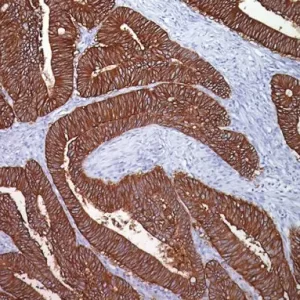Description
Heat shock proteins (HSPs) are an important part of the cell’s machinery for protein folding and also help to protect cells from stress. HSPs are expressed in tumor cell proliferation, differentiation, invasion and metastasis. In addition to improving overall protein integrity, Heat Shock Protein 70 antibody (HSP70) directly inhibits apoptosis and has been shown to be involved in a protective role against thermal stress and cytotoxic drugs. Recently, HSP70 has been reported as a prognostic marker in multiple cancer types.
SPECIFICATIONS
Specifications
| WEIGHT | N/A |
|---|---|
| DIMENSIONS | N/A |
| INTENDED USE | IVD |
| SPECIES REACTIVITY | Human |
| SOURCE | Mouse Monoclonal |
| CLONE | W27 |
| ISOTYPE | IgG2a |
| ANTIGEN | HSP70 from HeLa cells |
| LOCALIZATION | Nuclear and cytoplasmic |
| POSITIVE CONTROL | Breast Carcinoma |
| BY LETTER | H |
DATASHEETS & SDS
REFERENCES
1. Garrido C, et al. Heat shock proteins 27 and 70: anti-apoptotic proteins with tumorigenic properties. Cell Cycle 2006 Nov;5(22):2592-601. Epub 2006 Nov 15.
2. Thanner F, et al. Heat-shock protein 70 as a prognostic marker in node-negative breast cancer. Anticancer Res. 2003 Mar-Apr;23(2A):1057-62.
3. Torronteguy C, et al. Inducible heat shock protein 70 expression as a potential predictive marker of metastasis in breast tumors. Cell Stress Chaperones. 2006; 11 (1):34-43.
4. Banerjea A, et al. Immunogenic hsp-70 is overexpressed in colorectal cancers with high-degree microsatellite instability. Dis Colon Rectum. 2005 Dec;48(12):2322-8.
5. Huang Q, Zu Y, Fu X, Wu T. Expression of heat shock protein 70 and 27 in nonsmall cell lung cancer and its clinical significance. J Huazhong Univ Sci Technolog Med Sci. 2005;25(6):693-5.
6. El-Meghawry El-Kenawy A, El-Kott AF, Hasan. Heat shock protein expression independently predicts survival outcome in schistosomiasis-associated urinary bladder cancer. Int J Biol Markers. 2008 Oct-Dec;23(4):214-8.
7. Center for Disease Control Manual. Guide: Safety Management, NO. CDC-22, Atlanta, GA. April 30, 1976 “Decontamination of Laboratory Sink Drains to Remove Azide Salts.”
8. National Committee for Clinical Laboratory Standards (NCCLS). Protection of laboratory workers from infectious diseases transmitted by blood and tissue; proposed guideline. Villanova, PA 1991;7(9). Order code M29-P.







Reviews
There are no reviews yet.